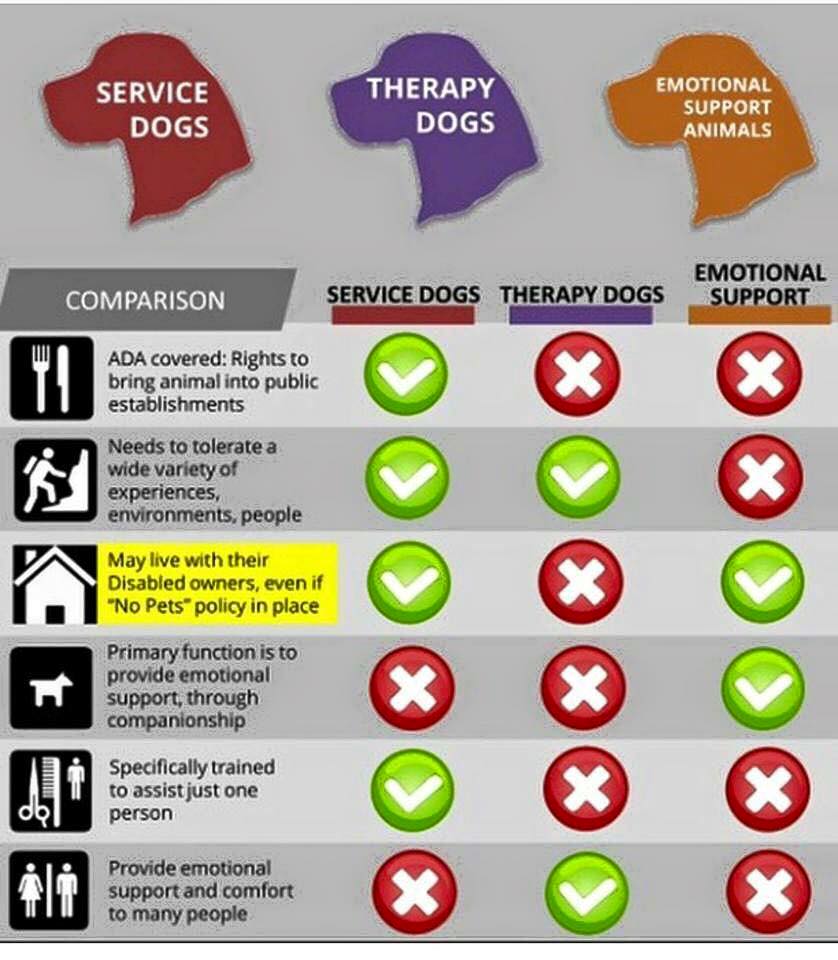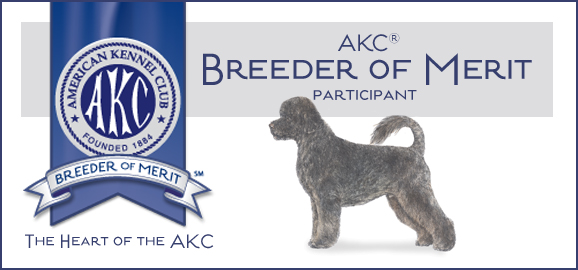Many people do not realize the difference between Service Dogs, Therapy Dogs, and Emotional Support Dogs. All three types of dogs serve a specific purpose, and should not be confused with one another. These terms are not to be interchangeably used between these types of dogs.

Therapy Dogs
Therapy Dogs often volunteer at schools, hospital, and assisted living facilities, along with reading programs at your local library. Therapy Dogs are born, they are not made! Yes, any dog can be trained to be mannerly and pass a Therapy Dog certification test, but that does not change the inherent temperament of the dog. Therapy Dogs must be bomb proof! They need to remain calm and friendly in highly stressful situations, while also being very tolerant of unsuspected handling by children and adults. A Therapy Dog's main job is to just be and these dogs' primary focus is people they are visiting. Studies have shown that Therapy Dog visits in hospitals and assisted living facilities help patients heal faster, reduce stress, and be happier. In a classroom setting, Therapy Dogs allow for more social interaction between peers and teachers, impulse control, dog safety awareness, verbal and reading skills. While Therapy Dogs are allowed places most pets are not allowed, they DO NOT have full public access rights.
To become a Therapy Dog, does are tested and certified by a number of Therapy Dog organizations. All organizations primarily test the temperament of the dog. Handlers are also given information about the appropriate way to do Therapy Dog visits as well to adhere to HIPPA laws, etc. The Therapy Dog organization will also require certified yearly health checks by a veterinarian to ensure the dogs are healthy and will not spread diseases or parasites to the people they visit.
Our Therapy Dogs
| Registered Name | Call Name | Therapy Dog Organization | Certified Date |
| Allyn Tyme to Batten Down the Hatches | Armada | Therapy Dogs International | 05/09/2015 |
| Allyn the One Two Love | Hava | Therapy Dogs International | 11/2015 |
| Allyn to Catenation | Caly | Therapy Dogs International | 10/08/2016 |
| Allyn Her BEguiling BEjio | Phoebe | Therapy Dogs International | 08/28/2018 |
Service Dogs
According to the Americans with Disabilities Act (ADA) Service Dogs are defined as dogs that are individually train to do work or perform tasks for people with disabilities. These dogs are specifically trained for certain tasks for people with disabilities, some tasks may include: guiding the blind, assisting a person in a wheelchair by opening doors, or picking up items that have been dropped, alerting an epileptic to an oncoming seizure, or alerting a diabetic to blood sugar issues. A Service Dog's primary focus is the disabled person he or she helps. This makes it incredibly important not to distract a Service Dog while out in public. It is highly recommended that you not interact with a Service Dog in public. That means no touching, talking to, or giving eye contact. While it is awe-inspiring to see a working Service Dog, the disabled person already gets enough unwanted attention by using a Service Dog so it is typically considered rude to ask to pet the dog, or ask other questions pertaining to the working team.
There is NO National Registry or certification for service dogs. Most service dogs are trained by service dog organizations, but they can also be privately trained. Service dogs have all access public rights, and a person who requires use of a service dog cannot be denied service or entry into any establishment that allows the general public. The fear of dogs, or concern about allergies are not valid reasons to deny entry or services. The lack of oversight and the little knowledge that businesses are legally allowed to gain makes it seem easy to scam the system and pretend a pet dog is a Service Dog, it is illegal to do so. Many states are passing stricter laws to prevent Service Dog abuse.
Our Service Dogs
| Registered Name | Call Name | Service Type |
| Tesouro’s Blackjack At Yr Svc | Jack | Guide |
| Allyn the Second Sight | Deja | Guide |
Emotional Support Animals
Animals that are considered ESAs are not required to have any specialized training. Their presence is enough to calm a person or reduce stress. These animals do NOT have all access public rights. There is also no national registry or certification for ESAs. This is the most commonly abused type of "support animal." Meaning people who want to be able to take their dog everywhere will pass them off as being a ESA, by taking advantage of the general public's lack of knowledge.

